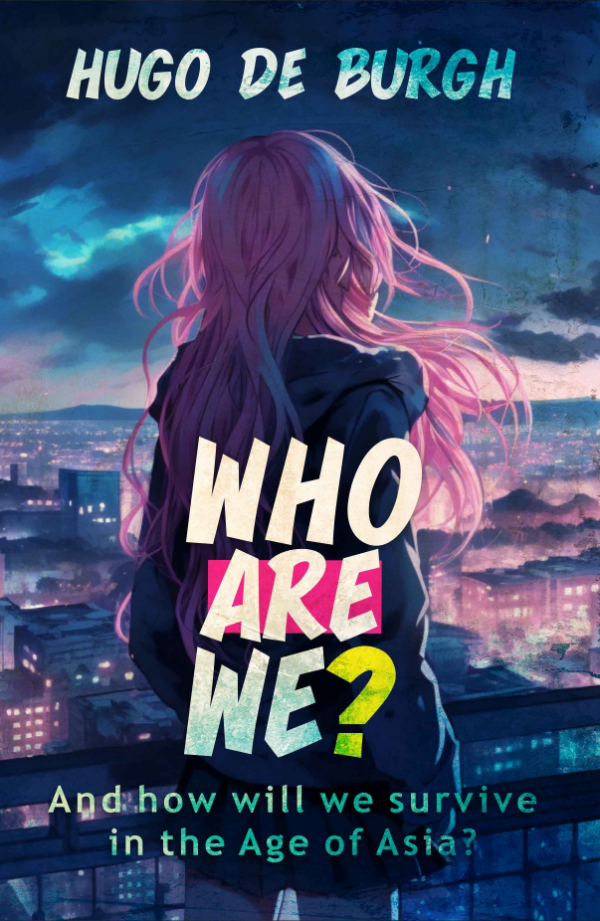

Published in December 2024 by CamRivers and launched at the London School of Economics
Who Are We?
And how will we survive in the Age of Asia?
The future looks bleak for Generation Z unless they can wrest the narrative from a derelict political class.
Politicians of left and right, obsessed with their own careers and blinded by outdated ideologies, have failed us. They have failed to rejuvenate our economy and consequently divided us into extremes of plutocrats and struggling commoners. They have sucked power and decision-making into the capital, leaving local communities and cities impotent. To rack up votes, they have bribed pressure groups with borrowed money which will be paid for by future generations in inferior services and higher taxes.
Worst of all, they have failed to adjust to the new geopolitical reality of our age: Asia rising in wealth and power. As a result, we won’t influence the great global questions of our time, from global warming to mass population movements and the proliferation of monstrous weapons of mass destruction.
The four nations of WISE [Wales, Ireland, Scotland and England, with all their ethnic and religious groups] are the world’s Revolutionary Nations. With five revolutions, they built the societies which much of humanity wants to emulate or emigrate to. But, today, progress is trapped; we need a Sixth Revolution.
From the perspective of a China watcher, Huge reminds us how and why WISE has been the hope of the world and shows how badly we need that Sixth Revolution if our economy and polity are to survive. WHO ARE WE? redefines WISE for the 21st century.
About WHO ARE WE?
It was when I looked aghast at the way in which our politicians began to bait and berate China, after the May 2019 visit of Michael Pompeo, then US Secretary of State, that I began this book. Not that I have the remotest sympathy for the Chinese Communist Party. No, I was not thinking of China but of ourselves. It seemed to me then, as now, that our politicians had no conception of their own country’s place in the world, were irresponsible in preferring personal grandstanding to thinking through our relationships with other countries and were indifferent to the interests of their electors, the British public.
I had been wanting, after many busy years, to realise my early ambition of writing fiction, so was out of touch with mainstream political issues. I tried to beef up on those and, as you can see from my citations, did some reading. Conversations were even more useful, and I list in the book those of my interlocutors who also were kind enough to read bits of the emerging manuscript and comment. None necessarily agree with me.
I have taken a risk in foisting upon my readers a new name for the Offshore Islands, WISE. The reasons are twofold: my background is multicultural and I do not want to exclude my country of origin, Ireland, from the discussions, even though my points about modern politics are based on Britain, from which Ireland is terminologically excluded.
My father, though born in the USA, was raised in Ireland and, in his passion for horses, fighting and pretty women, conformed to the stereotype of an Irish swashbuckler. His sister married at 19 to a stern Scot and lived most of her life in the Lowlands or Caithness. ‘I do not love the English’ she used to say, in the Dublin accent she used in private, ‘but I admire them’. It was she who showed me how to look at Britain from outside – from different cultures and from another era.
Uncle Hassan, an Arab friend who took a five year old me to watch the Limassol carnival, told everybody with great pride that the little man on his shoulders was English. As a child I would boast that I was English, because the prestige of England was so high among the Greeks, Turks, Armenians, Italians and Germans with whom I played. Later, in an English school, I defended my differentness by asserting that I was Irish. In my twenties it was sometimes politic to claim to be Scots, especially once I served in a Scots army unit and found myself a student of the Lallans language and complicated multiculturalism of Scotland. When people looked sceptical, I would remind myself that the wife of Scotland’s greatest king, Robert 1st, was one Elizabeth de Burgh, who had been imprisoned by Edward 1st of England, a mortal enemy.
Unlike my Celtic relatives, the English tend to be insouciant about peoples’ backgrounds. That my mother came from Ulster Unitarians and Aberdeenshire wee frees would have been of no relevance, as far as her English colleagues and associates were concerned. For them, we are all individuals, sui generis.
Why do I want to see WISE as one country, four systems, rather than be further broken up? The different traditions, the varied genes, have complemented each other over centuries; they need each other. England without the Irish would be dreich; Ireland without the Scots too passionate; Scots without Welsh poetry, dour. And now we have Asians, Africans and Eastern Europeans to enrich our lives yet further.
WHO ARE WE? then, is about WISE. Its past, its future.
There are many other delightful ways in which I could spend my time rather than fumbling into politics and exposing myself to the kind of vituperation that many of our MPs and commentators now suffer. I have been moved by Albrecht Haushofer’s Moabit Sonnets, particularly Schuld, guilt.
Haushofer, a member of the German resistance to Nazism, was executed on 23rd April 1945. Before he died, his poetry expressed the profound regret that he had not done more to oppose the evil of which he was now a victim.
